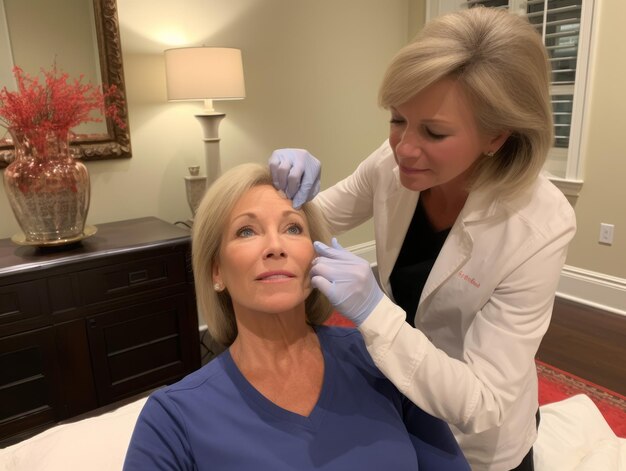Your Guide to Does Medicare Pay For Blepharoplasty
What You Get:
Free Guide
Free, helpful information about Medicare Insurance and related Does Medicare Pay For Blepharoplasty topics.
Helpful Information
Get clear and easy-to-understand details about Does Medicare Pay For Blepharoplasty topics and resources.
Personalized Offers
Answer a few optional questions to receive offers or information related to Medicare Insurance. The survey is optional and not required to access your free guide.
Interested in Whether Medicare Covers Eyelid Surgery? Here's the Scoop!
When considering cosmetic surgery, medical insurance coverage can be a labyrinth of policies and exceptions. For those contemplating blepharoplasty, or eyelid surgery, a common question is whether Medicare will foot the bill. The answer largely depends on your individual situation.
When Does Medicare Cover Blepharoplasty?
Medicare doesn't generally cover cosmetic procedures, but there are exceptions when the surgery is deemed medically necessary. Blepharoplasty can qualify if drooping eyelids hinder your visual field, impairing your ability to perform daily tasks. In such cases, a thorough evaluation, including a visual field test and photographs, is essential to substantiate the necessity. Should these tests demonstrate functional impairment, Medicare Part B could cover the procedure, given your deductible and copayment responsibilities are met.
Steps to Take Before Surgery
If you believe your eyelid condition meets the criteria, your first step should be consulting with a healthcare provider who accepts Medicare. They can help determine medical necessity, often involving:
- Comprehensive eye exams
- Detailed documentation of vision impairment
- Pre-authorization from Medicare
Keep in mind that each case is individually evaluated, and having ample documented evidence increases the likelihood of coverage.
Exploring Financial Assistance Programs
Even if your procedure is deemed medically necessary, out-of-pocket costs can still be significant. It's worthwhile to explore financial assistance programs that can alleviate these expenses:
Healthcare Financial Assistance Programs: Many hospitals and surgical centers offer programs that can reduce the cost of necessary procedures for eligible patients.
Medicaid: Depending on your state and circumstances, Medicaid may cover certain procedures that Medicare does not, or supplement costs that Medicare partially covers.
Nonprofit Organizations: Some charities assist individuals with medical expenses, particularly if they're linked to conditions impacting quality of life.
Flexible Spending Accounts (FSA) or Health Savings Accounts (HSA): If available, these can be used to pay for qualified medical expenses, potentially including blepharoplasty.
Beyond Medicare: Other Financial Solutions
If Medicare and additional assistance programs fall short, consider these financial strategies to manage costs:
Medical Credit Cards: Specialized credit cards offer promotions like interest-free plans for medical expenses, allowing you to pay over time without accruing interest.
Personal Loans: Many financial institutions provide loans specifically for healthcare needs at competitive rates, often with fixed monthly payments.
Payment Plans with Providers: Many clinics offer in-house financing options or flexible payment schedules.
Educational and Financial Empowerment
Empowering yourself with the right knowledge and resources can greatly reduce financial stress. Explore educational opportunities and financial aid that can provide stability:
📚 Educational Grants: Opportunities for further education can increase earning potential and financial security.
🎓 Vocational Training Programs: Enhance your skills and increase employment opportunities, potentially offering employer-sponsored health benefits that exceed Medicare.
💳 Credit Counseling Services: Work with counselors to manage debt more effectively and improve financial planning.
Understanding the complexities of Medicare and available financial resources ensures you're well-prepared to navigate the nuances of coverage and out-of-pocket costs for blepharoplasty. Prioritize gathering all required documentation, explore applicable programs, and consider creative financing options to manage this surgical need efficiently.
Financial Assistance Programs and Solutions
- 🏥 Hospital Financial Aid: Check with your local hospital for potential aid.
- 💊 Medicaid: Look into state-specific programs for possible coverage.
- 💳 Medical Credit Cards: Consider cards like CareCredit for manageable payments.
- 🏡 HSA/FSA Accounts: Utilize for eligible medical expenses.
- 📈 Credit Counseling: Access to manage financial obligations effectively.
- 📚 Educational/Training Grants: Enhance skills and opportunities.
What You Get:
Free Medicare Insurance Guide
Free, helpful information about Does Medicare Pay For Blepharoplasty and related resources.

Helpful Information
Get clear, easy-to-understand details about Does Medicare Pay For Blepharoplasty topics.

Optional Personalized Offers
Answer a few optional questions to see offers or information related to Medicare Insurance. Participation is not required to get your free guide.


Discover More
- Am I Elgible For Medicare
- Am I Enrolled In Medicare
- Am I Qualified For Medicare
- Are Adult Diapers Covered By Medicare
- Are Chemotherapy Drugs Covered By Medicare Part d
- Are Colonoscopies Covered By Medicare
- Are Covid Tests Covered By Medicare
- Are Cpap Machines Covered By Medicare
- Are Cpap Supplies Covered By Medicare
- Are Dental Implants Covered By Medicare
